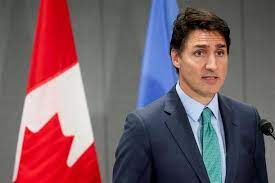NEW DELHI: The US has called on India to cooperate in a Canadian probe after its Prime Minister Justin Trudeau said he had shared with New Delhi “credible allegations” about the “involvement” of Indian agents in the killing of terrorist Hardeep Singh Nijjar.
Indian officials have also said they were engaged with their partners, but Canada had not provided any specific evidence so far. Shortly after Trudeau spoke to the media in Ottawa, Washington escalated the Nijjar controversy to the level of Secretary of State Antony Blinken, who acknowledged that the US had been consulting and coordinating “very closely” with the Canadians as it was worried about the implications of a transnational crime.
In a visit to the New York Times on Thursday, Trudeau had made a similar statement saying, “We are not looking to provoke or cause problems.” Blinken said it was “important for India to work with the Canadians on this investigation”, reiterating Trudeau who wanted India to “engage with us so that we can get to the bottom of this very serious matter. That’s important”. In Canada, US Ambassador David Cohen also said there was “shared intelligence among Five Eyes partners” that helped “lead Canada to making the statements that PM made”.
Though Blinken refused to comment on reports that US President Joe Biden had broached the Nijjar killing with PM Modi, he said Washington “has been engaged directly with the Indian Government”. “I think the most productive thing that can happen now is to see this investigation move forward, be completed. And we would hope that our Indian friends would cooperate,” he reiterated. Blinken also said, “We are extremely vigilant about any instances of alleged transnational repression, something we take very, very seriously.” Trudeau also framed the issue as a broader battle to defend the international rules-based order.
Meanwhile, the premier of British Columbia in Canada, David Eby, said the information provided in a briefing to him by the Canadian intelligence chief about Nijjar’s killing was “open source information” and he was “frustrated by our inability to get concrete information… and I have articulated that to the Federal Government”. However he conceded that some laws may have been preventing Canadian Security Intelligence Service (CSIS) from disclosing concrete intelligence. Speaking at a press conference, he urged reforms in that area so that provincial leaders could act on hard information in their local communities.


